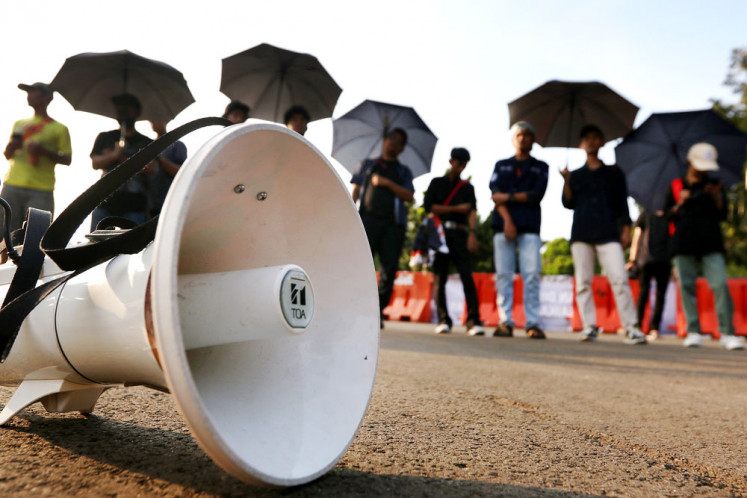RI warned of risk of massive capital outflow
Hefty capital streaming into Indonesia may become a double-edged sword that triggers another episode of massive reversal as experienced in mid 2013
Change Size

H
efty capital streaming into Indonesia may become a double-edged sword that triggers another episode of massive reversal as experienced in mid 2013.
To many, recent capital inflows are seen as the positive result of an improving economy and the government's reform measures. However, as external developments show, Indonesia cannot fully own the good news.
'Where else will foreign investors go? It's negative interest rate in many areas. That's why they come to Indonesia,' said Raden Pardede, former executive of the Danareksa Research Institute and now an economist at CReco Consulting.
Japan, for instance, announced a negative interest rate for the first time on Tuesday, following in the footsteps of other countries in Europe.
As the global situation remains uncertain, the Indonesia Stock Exchange (IDX) reported on Wednesday its second net buy in four days, bringing the total net buy figure to Rp 2.5 trillion (US$187.5 million) this year.
In the meantime, the Finance Ministry's financing and risk management office (DJPPR) reported the sale of 38.7 percent of its Tuesday bond auction ' worth Rp 15.6 trillion ' to foreign investors amid heavy demand.
Foreign investors now hold more than Rp 580 trillion of government debt papers, equal to almost 40 percent of the total, in the secondary market. This inflow seem to have helped the rupiah rise for the 10th day straight, its longest winning streak since 2010, according to data from Bloomberg.
Raden said that the current situation was a reminder of the 'hot money' era several years back, during which Indonesia enjoyed substantial amounts of foreign funds from the US' quantitative easing (QE) that began in 2009.
Those funds significantly propped up the rupiah beyond the country's economic fundamentals at the time. They sent the currency's real effective exchange rate (REER) to 102.57 at one point in 2010, above the fair value of 100, as shown by data from the Bank for International Settlements (BIS).
Meanwhile, former finance minister Chatib Basri warned that the stream of capital inflow might buoy the currency again to strengthen more than it should, driving imports to skyrocket and current account deficit (CAD) to widen.
Indonesia's CAD even reached its highest level ever in the second quarter of 2013 at 4.4 percent of gross domestic product (GDP). The situation turned even worse when the US announced that it would end its QE program. All of a sudden, foreign investors fled Indonesia, leaving the rupiah weak against the greenback and its stock market battered.
'We don't want to repeat the past episode, but we will possibly see capital reversal again in the next two years as interest rates increases in the US,' he said.
Bank Central Asia (BCA) chief economist David Sumual insisted that Indonesia take more precautionary measures ahead of the reversal, including by offering incentives to investors with long-term investment plans.
Separately, Bank Indonesia (BI) governor Agus Martowardojo and Coordinating Economic Minister Darmin Nasution acknowledged that a reversal was possible, with Darmin saying that Indonesia needed foreign funds from both portfolio and real investments.
They argued, however, that Indonesia was no longer in a very vulnerable state.
'We are in the process of attracting higher foreign direct investment that will be more sustainable in supporting the rupiah. At the same time, we are deepening our local market to slowly reduce dependence on foreign money in the portfolio market,' Darmin said.
-------------------
To receive comprehensive and earlier access to The Jakarta Post print edition, please subscribe to our epaper through iOS' iTunes, Android's Google Play, Blackberry World or Microsoft's Windows Store. Subscription includes free daily editions of The Nation, The Star Malaysia, the Philippine Daily Inquirer and Asia News.
For print subscription, please contact our call center at (+6221) 5360014 or subscription@thejakartapost.com









